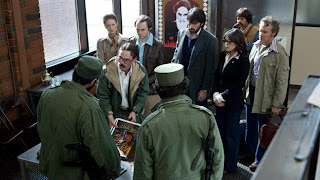Fifteen years ago Ben Affleck burst onto the Hollywood scene with the 1997 film
Good Will Hunting, which he co-wrote with childhood friend Matt Damon. Affleck and Damon went on to win an Academy Award for Best Original Screenplay. It seemed however that Affleck's acting career was quickly overshadowed by Damon as Hollywood played it's all time favourite game of comparison. In 2003 as Damon was riding the high of the successful
The Bourne Identity (Dir. Doug Liman), Affleck was trying to get away from the negative publicity that swarmed his critically panned film
Gigli (Dir. Martin Brest).
Affleck directs on the set of Argo
Affleck had a skill however that Hollywood had yet to see. In 2003 he directed a film he had written called Gone Baby Gone, an emotionally charged drama centered around the kidnapping of a little girl in Boston. He followed this with The Town in 2010, a critically acclaimed drama, set near Boston, in which he directed and starred. It seemed that Affleck had successfully stepped out of the shadow and into his very own spotlight. With two dramas under his direction, it wasn't a surprise to learn that his third film would also be a drama. It was a surprise however that he chose to take on a highly political subject like the 1979 American Embassy hostage crisis in Iran.
Affleck's Mendez goes through the plan with the American fugitives
Argo begins in the thick of it, the protests outside the American Embassy in Tehran. Flags are being burned, anti-American slogans are shouted passionately. Affleck doesn't just fly the camera through quickly and rush to the American point of view. His camera stays with the protestors, hearing their anger, letting them have their say. By the time you do get inside the embassy and meet the six fugitives to be you have an understanding that this is not a film about who is right and who is wrong. Politics, although always in the background, are never focussed on.
Mendez and O'Donnell (Bryan Cranston) pitch the best bad idea they've got
Just before the embassy is overrun six employees escape and are taken in by the Canadian Ambassador, Ken Taylor and his wife. There is a line in the film which states that the British and the Kiwis refused them help. This is factually incorrect. The British and the Kiwis helped get the fugitives to the Canadians, and Taylor and his wife played a much larger part in the rescue. This is a story where only one true hero can emerge however, and not surprisingly that hero has to be American.
John Chambers (John Goodman), Leister Siegal (Alan Arkin) and Mendez (Affleck) have one last toast before showtime
The film is emotionally powerful to say the least. It has you on the edge of your seat all the way through, allowing enough humour to break the tension, but never too much to distract from the gravity of the situation. The idea of sending Tony Mendez (Affleck) into Iran as a would-be filmmaker for the fictional film "Argo", and walking out with the six hostages posing as a film crew is ludicrous, yet as the film quotes "it's the best bad idea we've got". The first half of the film sets up the fake film. It needs to be real, so real that Hollywood buys it. Enter our producer Leister Siegal (Alan Arkin) and makeup artist John Chambers (John Goodman), the only two Hollywood players that know the truth of what the CIA is attempting to do. Arkin and Goodman supply much of the comic relief in the film and do it so brilliantly you eagerly anticipate their appearances on screen. Affleck's Mendez is sober, solemn and serious, the key player in showing the tension. As our protagonist his point of view becomes ours, where he goes we go, and where he goes is where no American would want to have gone in 1980. We have no reason to believe that he will be successful except for a short acknowledgement that he is the best and he's never left a man behind. However, we find ourselves daring to believe he'll be successful because the alternative is too tragic to consider.

The stakes are high as Mendez and the fugitives are questioned by security
What follows is a suspense-ridden, high stakes game of cat and mouse where the only way to win is if the mice keep a step ahead of the cat at all times. The cinematography creates the illusion of it being shot in the early 1980s, lending a nostalgic, somewhat documentary feel, creating a sense of realism. Although Mendez is clearly the hero of the film there is still a sense of ensemble work from the supporting cast, including a great performance by Bryan Cranston as Mendez's CIA supervisor Jack O'Donnell.
Affleck may never be able to fully shed the horror that was Gigli, but if that old Hollywood adage that you're only as good as your last film holds true then Affleck is going to be ok.































